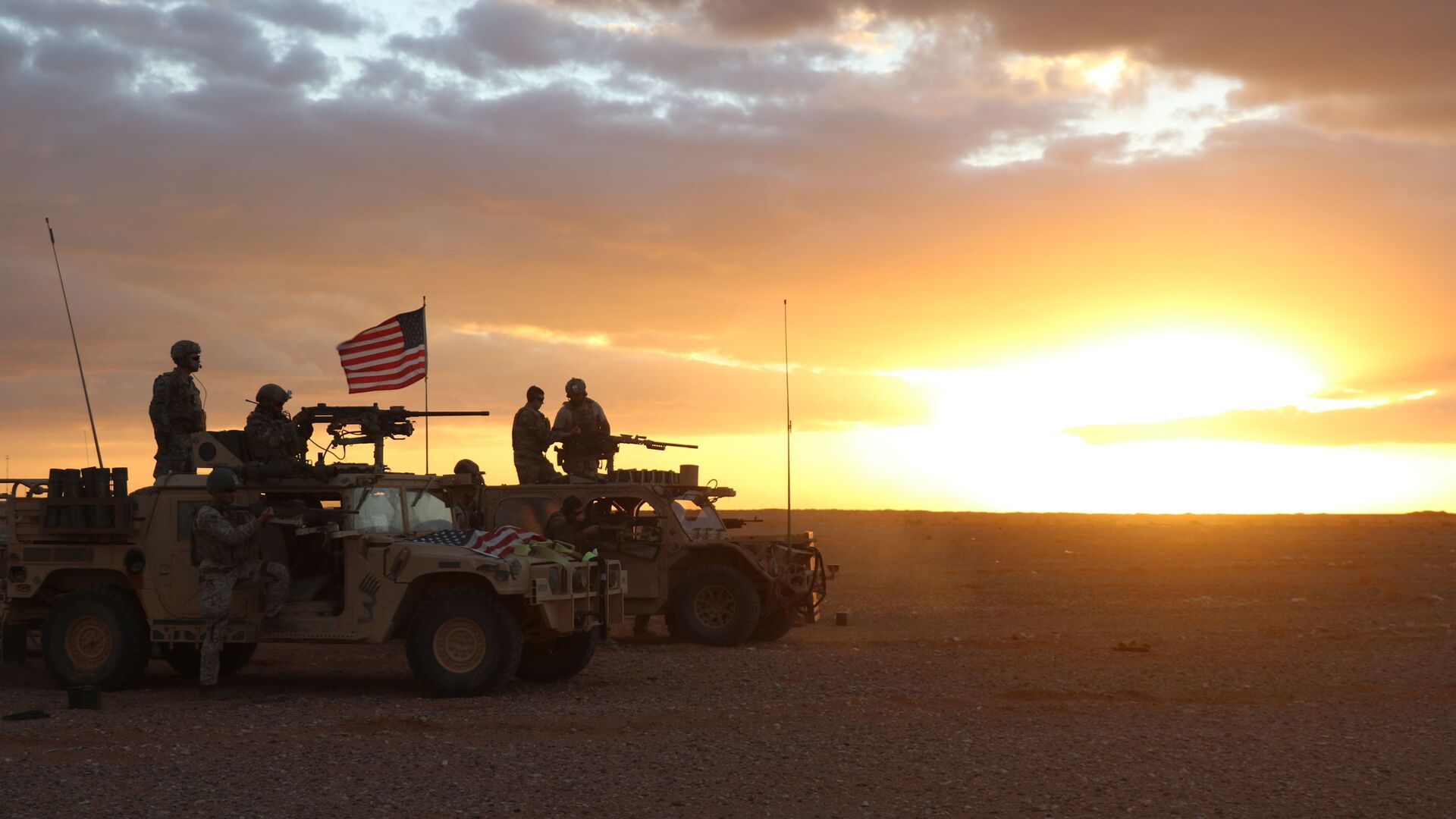https://sputnikglobe.com/20240202/us-has-overstayed-its-effectiveness-in-middle-east-1116546301.html
US Has ‘Overstayed’ Its ‘Effectiveness’ in Middle East
US Has ‘Overstayed’ Its ‘Effectiveness’ in Middle East
Sputnik International
The US has 'overstayed' its 'effectiveness' in the Middle East, former senior security policy analyst for the Secretary of Defense Michael Maloof told Radio Sputnik.
2024-02-02T01:49+0000
2024-02-02T01:49+0000
2024-02-02T01:49+0000
analysis
michael maloof
joe biden
iran
iraq
red sea
red sea crisis
persian gulf
https://cdn1.img.sputnikglobe.com/img/07e5/06/1c/1083260552_0:97:3073:1825_1920x0_80_0_0_a75bd0e34be2f9c5803320460816181a.jpg
Critics have started to ask if the US military presence in the Middle East is serving US interests. “What is the reason why we’re still there, either in Iraq or Syria? [In] Syria we’re illegally there, we were never invited. In Iraq, we were and now there’s talk about us getting out,” Michael Maloof, a former senior security policy analyst for the Secretary of Defense and author asked on Sputnik’s Final Countdown on Wednesday.Maloof doubts the US will strike inside Iran, with the hope that it will prevent a full response by the Iranian military. “I think the deep, dark secret is where they're going to hit. I don't think it'll be Iran, per se. And I think that that's what Iran was warning about - don't hit our sites,” he explained. “If we in fact do it,” the chance for “greater escalation… is very high,” Maloof added.Maloof called for a flexible foreign policy that reevaluates the situation and adjusts to changing conditions. “We’re sucking the oil resources of Syria and making money off it and not giving a dime to the Syrians. It’s their oil. It’s their resource, and they can’t seem to kick us out,” Maloof prefaced. “This is why this is a perpetual problem. We have to reevaluate what we’re doing.”The cause, according to Maloof, is that the US continually looks at and acts in the Middle East from a single perspective.Furthermore, the situation in the Middle East could quickly get out of hand, Maloof explained. “It could bring in Russia and China. I mean, this thing could get out of control completely. … Why do we want to continue on? We have Saudi Arabia and UAE saying, ‘Look we want normalization. We want to get this war over with so we can have normalization and bring some sanity to the region again’ but instead we’re provoking and continuing to agitate even further.”A war with Iran, even a cold one, would have disastrous consequences for the world, Maloof warned. “Iran could go the full length, shutting down the Strait of Hormuz. Between that and shutting down Bab al-Mandab, the other strait in the Red Sea, you shut off both the Red Sea and the Persian Gulf. [It would halt] a tremendous [amount of] trade [of] oil and gas – it would create a worldwide depression… and no one’s talking about it.”
https://sputnikglobe.com/20240130/biden-says-decided-how-to-respond-to-attack-on-us-base-in-mideast-doesnt-want-wider-war-1116498591.html
iran
iraq
red sea
Sputnik International
feedback@sputniknews.com
+74956456601
MIA „Rossiya Segodnya“
2024
News
en_EN
Sputnik International
feedback@sputniknews.com
+74956456601
MIA „Rossiya Segodnya“
Sputnik International
feedback@sputniknews.com
+74956456601
MIA „Rossiya Segodnya“
us response to iran, us response to drone attack, effects of iran-us war, will the war in the middle east escalate, iran warns the us, biden authorizes attack on iran
us response to iran, us response to drone attack, effects of iran-us war, will the war in the middle east escalate, iran warns the us, biden authorizes attack on iran
US Has ‘Overstayed’ Its ‘Effectiveness’ in Middle East
Days after the US State Department announced that three US troops were killed in a drone attack on a base near Jordan, US President Joe Biden blamed Iran, arguing that they provided weapons to the militants and promised a strong response, including hitting Iranian targets. Iran, in turn, said it would respond to any attack.
Critics have started to ask if the US military presence in the Middle East is serving US interests.
“What is the reason why we’re still there, either in Iraq or Syria? [In] Syria we’re illegally there, we were never invited. In Iraq, we were and now there’s talk about us getting out,” Michael Maloof, a former senior security policy analyst for the Secretary of Defense and author asked on
Sputnik’s Final Countdown on Wednesday.
“Clearly, we have overstayed our effectiveness in our influence [in the Middle East] because everyone uniformly hates us,” Maloof explained. “We really have to reevaluate what our policies are, and that’s not happening. All we’re doing is reacting now to events and what it’s doing is putting us on more of an escalatory approach and having us dig deeper holes than we ever wanted.”
Maloof doubts the US will strike inside Iran, with the hope that it will prevent a full response by the Iranian military. “I think the deep, dark secret is where they're going to hit. I don't think it'll be Iran, per se. And I think that that's what Iran was warning about - don't hit our sites,” he explained. “If we in fact do it,” the chance for “greater escalation… is very high,” Maloof added.

30 January 2024, 16:26 GMT
Maloof called for a flexible foreign policy that reevaluates the situation and adjusts to changing conditions. “We’re sucking the oil resources of Syria and making money off it and not giving a dime to the Syrians. It’s their oil. It’s their resource, and they can’t seem to kick us out,” Maloof prefaced. “This is why this is a perpetual problem. We have to reevaluate what we’re doing.”
The cause, according to Maloof, is that the US continually looks at and acts in the Middle East from a single perspective.
“We’re looking at the Middle East completely through the prism of Israel and look [at] what it’s gotten us. It started with Iraq… we spent trillions there, and what [do] we have to show for it? Nothing.”
Furthermore, the situation in the Middle East could quickly get out of hand, Maloof explained. “It could bring in Russia and China. I mean, this thing could get out of control completely. … Why do we want to continue on? We have Saudi Arabia and UAE saying, ‘Look we want normalization. We want to get this war over with so we can have normalization and bring some sanity to the region again’ but instead we’re provoking and continuing to agitate even further.”
A war with Iran, even a cold one, would have disastrous consequences for the world, Maloof warned. “Iran could go the full length, shutting down the Strait of Hormuz. Between that and shutting down Bab al-Mandab, the other strait in the Red Sea, you shut off both the Red Sea and the Persian Gulf. [It would halt] a tremendous [amount of] trade [of] oil and gas – it would create a worldwide depression… and no one’s talking about it.”



